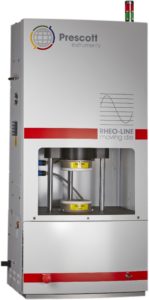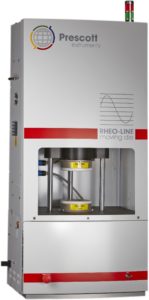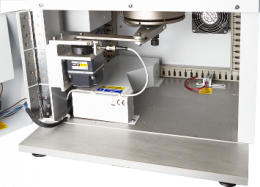Prescott ’s Rheoline Moving Die Rheometer (MDR) has been designed to carry out tried and proven test specifications in accordance with international standards. Providing fast, accurate data and meeting the requirements of a modern testing laboratory, the Rheoline MDR is ideally suited to both the production environment and for use in the development of elastomeric compounds.
Moving Die technology is a well-proven process that can significantly reduce your traditional testing and analysis times. At the heart of the Rheoline system is a rotor-less biconical die assembly with an internal cavity of only 2.8cm ³. The lower die oscillates at 1.67 Hz over amplitudes of 0.5°, 1.0°, or 3.0° whilst the top die remains fixed and accurately measures the reaction torque, producing precise, repeatable data in an extensive range of testing environments.
The digital electronics module and 16-bit PID algorithm apply quick, accurate temperature control with a variati on of ± 0.03 °. This MDR is available with various options including automatic loading/unloading systems, a pressure transducer for measuring the axial load exerted by the sample, and variable die temperature while the test is in progress.
The Rheoline equipment is interfaced to a personal computer running Windows Software, and is designed to carry out tests in accordance with international standards.
The test results are performed and displayed as plotted curves on a graph and the information can then be printed out as and when required, or stored on the computer’s hard disk for reference. The flexible Labline soft ware has no limit to the number of data points that can be selected or the number of tests that can be performed and displayed. Professional reports can also be produced with your own logos incorporated. These reports can then be printed, exported or sent by email.
Application information
- Elastic torque
- Viscous torque
- Tangent delta
- Cure Rate
- Pressure in Cavity
Data calculation
- Initial
- Minimum
- Maximum
- Scorch Points
- Percentage Cure Points
- Reversion
- Cure Rate
- Delta Cure
- Quality Control Pass/Fail
| Design Spec. | ISO No. 6502 / ASTM D5289 |
| Die Configuration | Bi conical, Sealed system |
| Oscillation Frequency | 1.67Hz |
| Oscillation Amplitude | 0.5, 1.0, 3.0 degrees (0.5 Standard, 1 & 3 optional) |
| Temperature Control | 3 term PID, control accuracy to +/- 0.03 ºC |
| Temperature Range | 35 to 250 °C |
| Torque Range | 0 to 200 dNm |
| Electrical | Single Phase 220/240V 50HZ, 110v 60Hz. |
| Pneumatics | Filtered air, 4.2 Kg/cm, (60 psi) |
| Units of measurement | Torque (In/lbs, dNm) Pressure (Lb/sq.in or Kg/sq.cm [optional]) Temperature (Celsius, Fahrenheit) Time (Min/Sec, Min/Decimal) |
| Transport & Storage Conditions | Relative Humidity up to 90%, non condensing Temperature – 10 to 50 °C |
| Weight | 200 kg |
| Dimensions (W x D x H) | 575 mm x 570 mm x 1280 mm |
| PC specification | Pentium processor, networkable. |
| Data format | All data stored in accessible format allowing easy. Export to all other packages. |
| Optional Extras Available: | Programmable temperature Zones Additional oscillation Eccentric Pressure Transducer Auto-loading Module (4 samples/16 samples) Volumetric MDR Sample Cutter |





